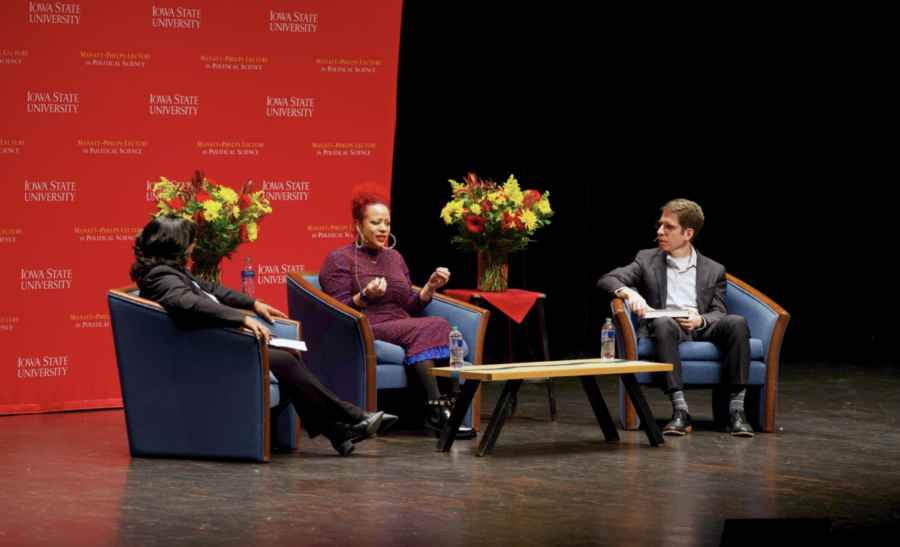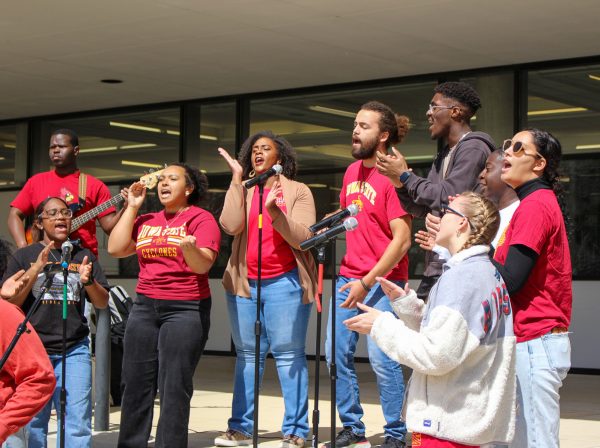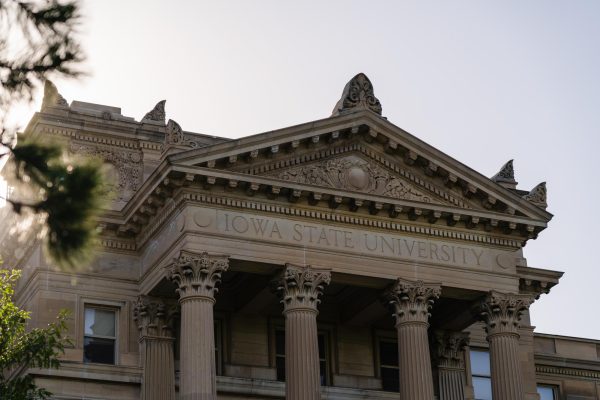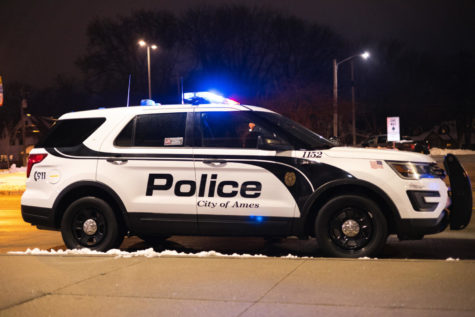Pulitzer Prize winner speaks about 1619 Project on mapping slavery
Nikole Hannah-Jones discusses the 1619 Project with Alex Tuckness and Monic Behnken during the 2022 Manatt Phelps-Lecture.
Pulitzer Prize-winner and Iowa native Nikole Hannah-Jones discussed the award-winning 1619 Project during a question-and-answer conversation surrounding its creation and racial inequality at Wednesday night’s 2022 Mannat-Phelps lecture.
Along with Hannah-Jones, the panel included Alex Tuckness, the department chair for Iowa State’s political science department, and Monic Behnken, the associate dean for Liberal Arts and Sciences, who led the conversation through questions of their own and those posed by audience members beforehand.
The 1619 Project originally began as a special project for New York Times but was later lengthened into a book arguing that slavery predates almost every other institution that would become America.
Currently, a bill is advancing in Iowa to ban its teaching in public schools.
“Really, the book is an argument, and it’s an argument for the centrality of slavery in the American story,” Hannah-Jones said.
The book is a compilation of essays by Black writers that explores the ways modern American phenomena are connected to slavery in surprising ways, according to Hannah-Jones.
“It is attempting to be a people’s project,” Hannah-Jones said. “A project that represents the vastness of the talent of all of these descendants who are at the top of their field.”
Tuckness read a question asked by an Iowa State staff member who wanted to know how Hannah-Jones’ upbringing in Waterloo, Iowa, influenced her need to educate about the history of enslaved persons.
Hannah-Jones explained that Waterloo is the most heavily Black city in Iowa and, for that reason, also the most segregated. This experience led her to only get the chance to learn about Black history during a one-semester course in high school.
“My world is really being shaped not just by what we were taught, but by the silences– by the absences,” Hannah-Jones said. “Ultimately, the 1619 Project is about the silences of history and trying to fill in those types of information.”
Trying to fill in these absences led Hannah-Jones into her career as a journalist.
“Is there one chapter of the book that you feel encapsulates the essence of what you were trying to communicate in the 1619 Project?” Behnken said.
Hannah-Jones answered with the last chapter, an argument for reparations for the descendants of American slavery.
“If you read this entire book from start to finish, there’s only one conclusion that a moral people can come to,” Hannah-Jones said. “The entire book is really an argument that we have to confront what we’ve done; we have to atone for it and then we have to repair that damage.”
When asked how the 1619 Project has been misunderstood, Hannah-Jones explained that those who argue against the project are arguing based on the words of others.
“It was something that Trump said or something that Tom Cotton said something or Mitch McConnell said or, you know, whoever it is on Facebook,” Hannah-Jones said. “So, the biggest misperception is people actually have no interest in the book, but I think the most common thing people think is that the book is anti-American.”
Tuckness read the last question of the night posed by an Iowa State student who asked Hannah-Jones what ways a person can constructively promote racial equality.
“I think people want kind of an easy thing, you know, like put up the Black Lives Matter sign in your yard or whatever,” Hannah-Jones said. “The reason I wrote the book on reparations is because I didn’t want to take us through the whole journey and not lead to somewhere.”
Hannah-Jones shared that there is currently a reparations bill before Congress and asked those in attendance to be vocal about it and call Congress.
Hannah-Jones concluded by sharing her recent project, a six-part documentary on the 1619 Project that will air on Hulu and ABC next year.
Your donation will support the student journalists of the Iowa State Daily. Your contribution will allow us to purchase equipment, send our student journalists to conferences and off-set their cost of living so they can continue to do best-in-the-nation work at the Iowa State Daily.













Phillip Clearman | Nov 3, 2022 at 10:01 pm
The 1619 Project is a load of garbage that should never have been taken seriously. It completely ignores how much opposition there was to slavery before, during, and after America’s founding and fight for independence. We had a whole civil war over it where 300,000 young men from the Union Army died to end that evil practice. Does that sacrifice mean nothing to these people?
Nuke | Nov 7, 2022 at 8:26 am
Two things can be true: this country does not exist without the enslavement of folks AND there was opposition to slavery. The focus of “1619” is on the former. Until folks can start to look at things through a nuanced lens, it’s going to be really tough to convince anyone, much less someone who says a book is garbage because it doesn’t address the sliver of history that they want it to.
Eugene Morrow | Jan 28, 2023 at 11:28 pm
“Two things can be true: this country does not exist without the enslavement of folks”
This country doesn’t exist without the contributions of many different ethnic groups. What exactly makes African Americans more deserving than any of the others to have their ‘history’ put front and center? The vast majority of which resided primarily in the Black Belt Southern states prior to WW1.